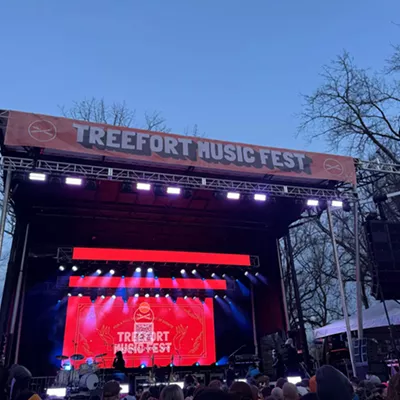When the trumpet cries, that's when the citizens of New Orleans are standing on their roofs, shouting for help. It's a fusion of music and emotion, created by a New Orleanian for the people of his city, and it's devastating and beautiful, all at the same time.
& lt;span class= & quot;dropcap & quot; & D & lt;/span & an Keberle, Whitworth's director of jazz studies -- who knows how to judge, since the man plays a little trumpet himself -- includes Blanchard in a very select trio. Keberle puts Blanchard, along with Wynton Marsalis and Nicholas Payton, "at the top of current jazz trumpeters. He's a true born-and-raised jazz musician who has all the technique plus a distinct and personal sound and very expressive playing."
Keberle also appreciates Blanchard as an ambassador of jazz who works at popularizing jazz and extending its influence: "More than Wynton or Payton," says Keberle, Blanchard "has carried on the jazz tradition -- not only swinging like Wynton, but immersing the jazz sound in all current styles of music: pop, blues, rock, avant garde, free and yes, all the movie scores. I think he has done this better than anyone since Miles Davis."
As much as any other jazz musician today, Blanchard is spreading the gospel of an underappreciated, distinctively American art form. He's bringing his horn and his expertise to Whitworth this weekend.
Jazz education isn't just an obligation for Blanchard -- "it's 50 percent of what I do," he says. Not only does he travel around the country delivering jazz workshops like the one he'll lead on Friday evening, but he's also artistic director of the Thelonious Monk Jazz Institute at USC in Los Angeles. His work there proves that, far from dying out, jazz is a living tradition with a bright future.
"One of the things I've learned while teaching at the Monk Institute," Blanchard says, "is that when you give some of these young players some direction on how to develop their own ideas, some of the things they come up with are amazing.
"I tell a little joke to my students," he says, and then he affects a sly, wheedling voice: "'On my next album, if you hear a little somethin' that sounds like it's yours -- well, you know, sometimes I get a little influenced.'" His laughter is throaty and deep.
& lt;span class= & quot;dropcap & quot; & B & lt;/span & lanchard is open to the possibilities for creativity that emerge even out of tragedy. In his Requiem for Katrina, he has expanded and orchestrated his score for When the Levees Broke. But what exactly was God's will with that hurricane?
"I can only give my impression," Blanchard says, "but I think all of it was God's will -- the horrible tragedy, everything that led up to it, and during it and after it. The result is that people around here have woken up and seen the light. There are people who are taking on responsibilities themselves instead of waiting for the government to do it for them. There are people working together now who wouldn't have been before -- clergy working with legal folks. There are people trying to rebuild in places where there was nothing but people committing crimes. There are people here in church groups who are helping others rebuild their homes -- you name it."
He knows about rebuilding: After apprenticeships in the '80s with Lionel Hampton and Art Blakey, Blanchard took four years off to work on his embouchure. The result? Seven Grammy nominations (three of them for best instrumental jazz solo) along with a win in 2002 for his contribution to McCoy Tyner's Illuminations. Then there are the 42 film scores he has penned, including the music for Jungle Fever, Malcolm X, Crooklyn, Get on the Bus, Eve's Bayou, Barbershop, Inside Man and Talk to Me.
& lt;span class= & quot;dropcap & quot; & S & lt;/span & aturday night's concert will kick off with the Whitworth University Jazz Band -- "one of the strongest ever," says Keberle, in his 19 years at the school -- playing some of Keberle's own arrangements of Basie-style blues; some tunes by the Duke and Cannonball; and a handful of charts that will show off the band's sax and trumpet sections.
After intermission, Blanchard, 45, will play several jazz standards: Duke Ellington's "Caravan," Art Blakey's "Fuller Love," Oliver Nelson's "The Blues and the Abstract Truth," Wayne Shorter's 'JuJu," Lee Morgan's "I Remember Clifford," and Dizzy Gillespie's "A Night in Tunisia," with its extended and malleable solo. "I think you would do a disservice to Dizzy if you were to play that piece the same way every night," says Blanchard. "Those guys were all about individual expression."
Terence Blanchard has his own expressiveness down now. The burden of carrying on jazz giants' traditions, he says, doesn't weigh heavily upon him: "I got over that years ago. I don't think about that. Maybe when I was younger, but not now."
When Katrina hit, beds were blown out the windows of the New Orleans Hyatt Regency. In the two months following, 700 bodies were recovered in the Crescent City alone -- floating, bloated beyond recognition. In A Tale of God's Will, Terence Blanchard's trumpet weeps for them -- but at Whitworth on Saturday night, he'll also point the way toward renewal. The man knows something about how to rebuild.
Terence Blanchard at Whitworth's Cowles Auditorium on Saturday, Nov. 10, at 8 pm. Tickets: $10. Blanchard will lead a jazz clinic in Whitworth's Music Building on Friday, Nov. 9, at 5:15 pm. Free. Call 777-3280.





















